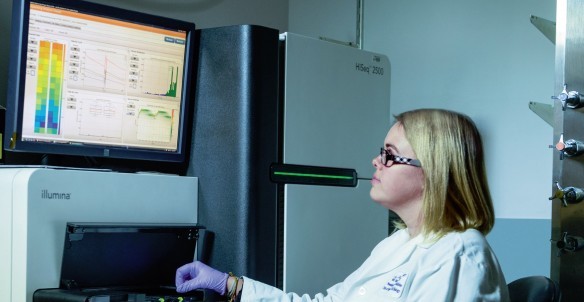Precision Medicine for Kids with Cancer: At Columbia, Every Pediatric Tumor is Sequenced

Every pediatric cancer patient at Columbia University Medical Center benefits from genome sequencing of the tumor. Using technologies that have until now been largely restricted to research use and have taken many months to process, the Precision in Pediatric Sequencing (PIPseq) program provides results to the patient’s doctor in less than three weeks. That is the latest advance from one of the nation’s oldest programs for children with cancer and blood disorders.
“We recognize that a diagnosis of cancer or a blood disorder is a frightening prospect that affects not only the child, but the entire family,” says Andrew Kung, MD, PhD, chief of the pediatric hematology, oncology, and stem cell transplantation division at CUMC and the Robert and Ellen Kapito Professor of Pediatrics at Columbia University College of Physicians and Surgeons. “There have been dramatic advances in the way we manage pediatric cancers and blood disorders, and today patients are reaping the benefits of decades of research.”
The PIPseq program strives to identify the molecular drivers of each patient’s cancer to use the information to personalize treatment using novel biologically targeted investigational agents. “With next-generation sequencing,” says Julia Glade Bender, MD, medical director of PIPseq, “we can delve deeper into the genetic basis of cancer to pinpoint novel therapeutic targets.”
A diagnosis of cancer or a blood disorder is a frightening prospect, but there have been dramatic advances in the way we manage pediatric cancers.
In early 2014, with support from the Herbert Irving Comprehensive Cancer Center, the division started performing genome sequencing of tumors in patients with high-risk or relapsed cancers, and the sequencing is now offered for all pediatric cancer patients. “No other pediatric cancer program is applying precision medicine to the problem of childhood cancers the way we are,” says Maria Luisa Sulis, MD, head of hematologic malignancies for PIPseq. “We are one of the only programs prospectively sequencing cancers and using the results to make clinical decisions for our patients.”
Adds Dr. Kung, who was recruited to Columbia in 2012 from the Dana-Farber Cancer Institute/Boston Children’s Hospital: “Columbia’s program is rooted in science, and the rich connection between basic science and clinical care allows us to provide cutting-edge care for people with cancer. We are combining the fruits of these investigations with advances in genomics and molecular biology to identify more precise methods to treat patients.”
Read more about Columbia’s cancer programs at Columbia.edu/cancer.
Read more about Columbia’s pediatric cancer program.
Tune in March 30 for the start of a documentary based on the book by Columbia physician and researcher Siddhartha Mukherjee. Read more.
